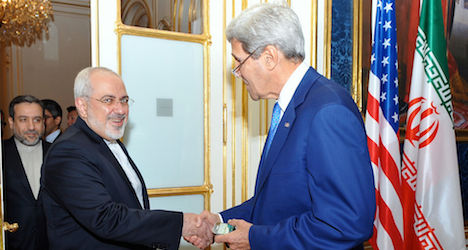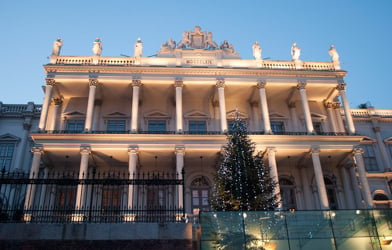Such an accord — which both sides want to tie up in only six weeks — is aimed at easing fears that Iran might get nuclear weapons after more than a decade of rising tensions, according to a report from Agence France-Presse (AFP).
Quoted by Iranian media as he arrived in Vienna, Mohammad Javad Zarif said there was "general agreement" but that "numerous questions still need to be resolved".
Due to be joined in the Austrian capital on Wednesday by US Secretary of State John Kerry, Zarif said these included the "vital issues" of "uranium enrichment and the lifting of sanctions".
Negotiating intensively for months, Washington and other major powers — China, Russia, Britain, France and Germany (known as the P5+1) — want Iran to reduce the scope of its atomic activities in exchange for relief from punishing sanctions.
The Islamic republic, whose President Hassan Rouhani has sought to mend ties with the West, denies wanting the bomb and says it wants to expand its nuclear programme in order to produce electricity and for cancer patients.
Last November Iran and the P5+1 struck an interim deal and gave themselves until July 20 to reach a lasting accord. They missed that deadline however and the parties are now aiming for an agreement by November 24.
'Fairly wide gaps'
The two sides remain far apart, particularly on the central issue of Iran's future capacity to enrich uranium, a process that can produce fuel for reactors but also, at high purities, the core of a nuclear bomb.
"There are still fairly wide gaps on certain critical issues, and that's what we'll be talking about," US State Department spokeswoman Marie Harf told reporters on Friday.
The Vienna talks on Tuesday, following on from discussions in New York last month, involved Wendy Sherman, Washington's lead negotiator, her Iranian counterpart Abbas Araqchi and the powers' chief negotiator, EU foreign policy head Catherine Ashton.
Russia's chief negotiator, Sergei Ryabkov, said in Moscow that a "mini-round" involving all Iran and the six powers would take place in Vienna on Thursday, Interfax reported.
A spokesman for Ashton confirmed that to reporters in Vienna, saying the all-in meeting would see Zarif meeting P5+1 political directors.
Analyst Kelsey Davenport from the Arms Control Association told AFP that this week's talks were "critical" and that a deal by November 24 was "still possible if both sides… are willing to be flexible and creative".
But experts have speculated that the parties might extend the deadline yet again. Araqchi said on Friday that such a move was "possible".
"Our will is that in 40 days the matter will be resolved. But if other things happen and we are not able to solve all the problems, the two camps will find a solution," Rouhani said Monday.



 Please whitelist us to continue reading.
Please whitelist us to continue reading.
Member comments